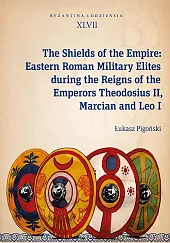The Shields of the Empire: Eastern Roman Military Elites during the Reigns of the Emperors Theodosiu. Byzantina Lodziensia XLVII
The Shields of the Empire: Eastern Roman Military Elites during the Reigns of the Emperors Theodosiu. Byzantina Lodziensia XLVII
Opis publikacji
When the emperor Valentinian III murdered the general Flavius Aetius, it has been observed that he had ‘cut his right hand with his left’, and the story of the fall of the ‘last Roman’ has been put in the greater context of the subsequent dissolution of the Roman Empire in the West. However, a similar deed committed by the emperor Leo in the East in 471, when he ordered the killing of the general Aspar, certainly did not gain such a legendary status. The underappreciated story of the survival of the Eastern Roman Empire in the turmoil of the fifth century is however no less dramatic,and the role that powerful military leaders played in those events was certainly paramount. This publication aims to reconstruct the involvement of the Eastern Roman military elite in various matters of the state on the wider background of political history marked by the reigns of the emperors Theodosius II (408-450), Marcian (450-457), and Leo I (457-474). On its pages, the author pres...
When the emperor Valentinian III murdered the general Flavius Aetius, it has been observed that he had ‘cut his right hand with his left’, and the story of the fall of the ‘last Roman’ has been put in the greater context of the subsequent dissolution of the Roman Empire in the West. However, a similar deed committed by the emperor Leo in the East in 471, when he ordered the killing of the general Aspar, certainly did not gain such a legendary status. The underappreciated story of the survival of the Eastern Roman Empire in the turmoil of the fifth century is however no less dramatic, and the role that powerful military leaders played in those events was certainly paramount. This publication aims to reconstruct the involvement of the Eastern Roman military elite in various matters of the state on the wider background of political history marked by the reigns of the emperors Theodosius II (408-450), Marcian (450-457), and Leo I (457-474). On its pages, the author presents the history of the numerous wars in which the Empire found itself entangled in during that uneasy time, as well as the periods of conflict and cooperation between the generals and the emperors. The focus is not only on the military elite as a group, but also on outstanding individuals, such as generals Plintha, Flavius Zeno, Aspar or Zeno-Tarasikodissa, the aforementioned emperors and their civilian advisors. The result is a comprehensive study and a novel interpretation of the nearly seven decades of turmoil that, contrary to what happened in the West, curiously did not result in the collapse of the Eastern Roman state; perhaps, as the author argues, in no small part due to those military leaders, who were serving and protecting it.
![profinfo_czerwiec_bon_lato_1920x60.jpg [38.99 KB]](https://www.profinfo.pl/storage/image/core_files/2025/6/17/1751555b766a09db6f39a2100c945186/jpg/wkprofinfo/frontend/profinfo_czerwiec_bon_lato_1920x60.jpg.webp)


